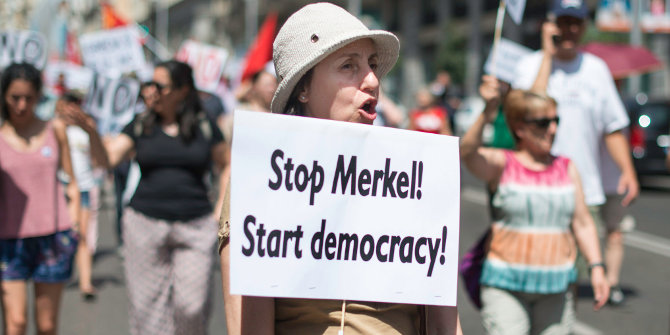 Creating spectacle in whatever form sells copy, but it also greatly increases visibility. Politicians need visibility and need the media in order to reach the electorate, to get through to them. This has created a very symbiotic but also a toxic relationship between political and media elites, writes Bart Cammaerts. With the disproportional degree of power the media holds comes responsibility, transparency and above all the need for accountability, for genuine checks and balances, which are currently absent.
Creating spectacle in whatever form sells copy, but it also greatly increases visibility. Politicians need visibility and need the media in order to reach the electorate, to get through to them. This has created a very symbiotic but also a toxic relationship between political and media elites, writes Bart Cammaerts. With the disproportional degree of power the media holds comes responsibility, transparency and above all the need for accountability, for genuine checks and balances, which are currently absent.
Before embarking on an academic career, I have been a (freelance) journalist and one of the spokespersons (or spin doctors, as you wish) for the then vice-prime minister of Belgium (Elio Di Rupo of the Socialist Party). From this perspective, it is not unsurprising that I have been following the hacking trials as well as the Leveson Inquiry with great interest. I do not particularly want to dwell on why Brooks got off very lightly and Coulson did not or whether the PM spoke too early, it is more the birds eye view focusing on the broader picture that is of interest to me.
What this whole episode in British media history has exposed is more interesting than the wrong-doings of individuals. Concerning this whole episode comprising of the deeply unethical behaviour by the media, the attempts to cover it up, the hacking trial, but also the Leveson inquiry, there are four aspects that are of particular importance to discuss further: 1) The close interwoven-ness of political and media elites, 2) the precise nature of media power and how it is wielded, 3) the complete lack of an ethical framework amongst some media in the UK and 4) the rejection by most media actors of any form of regulation enforcing a regime of responsibility and deontology. All of them are of course interconnected. Let me address them one by one.
We not only live in a hyper-saturated media context, but arguably we have also become much more dependent on media and on mediating devices to seek, receive and share information. In addition to this, as the French Marxist Guy Debord already observed at the end of the 1960s, we are all part of the society of the spectacle. Both the media and politicians are part of and abide by the spectacle. Creating spectacle in whatever form sells copy, but it also greatly increases visibility. Politicians need visibility and need the media in order to reach the electorate, to get through to them. This has created a very symbiotic but also a toxic relationship between political and media elites cozying up to each other, going to the same (garden) parties, exchanging the same gossip, attending the same schools and universities and adhering to similar values.
The question this engenders is: who leads the dance? It seems that in recent times the media is leading the dance more than politicians are. The media are seen to sway considerable power in our democratic societies, which explains why politicians of all persuasions try to develop extremely good and exclusive relations with journalists and with media owners. “Through the spectacle”, Debord contended, “power of modern society has detached itself from that society and established an independent realm […] The spectacle plays the specialized role of speaking in the name of all the other activities. It is hierarchical society’s ambassador to itself, delivering its messages at a court where no one else is allowed to speak.”
The media’s power in the society of the spectacle manifests itself at several levels of analysis. They are seen to have a high degree of discursive power which refers to the ability of the media to frame an issue, but at a deeper level also to shape reality, to produce common sense – referring to Debord again: “reality emerges within the spectacle, and the spectacle is real”. A good example here would be the way in which the tabloid media play a deeply problematic role in terms of promoting prejudice, sexism, racism and jingoistic nationalism. The second media power relates to the ability of the media to provide or deny access to audiences and by extension to the electorate and also the power to define the nature of that access. At this level media power is articulated as the power to include and to exclude, to give the privilege of visibility or to silence and keep hidden (cf. the lack of coverage of the anti-austerity protests last week). The final form of media power has to do with resource power, the capitalist structures in which media organisations are embedded as well as the way in which the other two powers are yielded to maximum effect in order to pressurize political actors to not regulate the media in any way, to relax media ownership rules and to condone media concentration. It suffices in this regard to refer to the grip of Murdoch on the British (as well as US and Australian) media.
The third point I want to raise here relates to the notion of (media) ethics. The media arguably play a pivotal role in a democracy and as a result of this there are a whole set of normative expectations we have as a society towards the media and journalism in terms of how they are supposed to act, whose interests they should defend (ours) and which roles they need to fulfill. I could refer here to the liberal role of the watchdog, the media as the canary in the coalmine, but also social responsibility models which foreground the requirement of the media to contextualize the day’s events and provide a platform for public debate about controversial issues. Out of these normative models also came a whole set of deontological guidelines and rules which are formalized in a whole range of deontological codes to which journalists are supposed to abide by. It has been evident for a while that a large part of the British ‘journaille’ has over the years acted in contravention of these codes.
This brings me to my final point, namely the need for a more efficient and potent regulatory system to curb the excesses of the UK media and restore trust in British journalism which is at an all-time low. As the philosopher Onora O’Neill pointed out some years ago the media in the UK basically have a license to deceive and, as has become apparent, they have used this license profusely over the last decade. As O’Neill argued back in 2002, we should unequivocally revoke this license: “the media, in particular the print media – while deeply preoccupied with others’ untrustworthiness – have escaped demands for accountability […] A free press can be and should be an accountable press.”
All this thus warrants rethinking press freedoms and establishing the boundaries of what is ethically acceptable in terms of news gathering as well as better defining what journalists can and cannot do in the public’s interest. This does NOT amount to censorship nor to the abolishment of a free press as the Daily Mail and the Murdoch press makes us believe, but has to do with re-asserting a set of ethical principles and to make sure serious transgressions get properly penalized. As has become apparent the last couple of years, self-regulation is not fit for this purpose.
With the disproportional degree of power the media holds comes responsibility, transparency and above all the need for accountability, for genuine checks and balances, which are currently absent. As also argued by O’Neill: “If we are to restore trust we shall have to start communicating in ways that are open to assessment, and to do this we need to rethink the proper form of press freedom.”
Note: This article gives the views of the author, and not the position of the British Politics and Policy blog, nor of the London School of Economics. Please read our comments policy before posting. Featured image credit: David Shankbone
 Bart Cammaerts – London School of Economics
Bart Cammaerts – London School of Economics
Bart Cammaerts is Associate Professor Director of PhD Programme in the Media and Communications Department at the London School of Economics.







